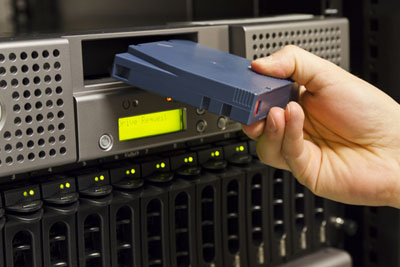

Langmeier Backup
Data sheets:
Data sheets:
Contact Langmeier Software
Reseller Partner
About the company
Choose your region
- Europe
- Middle East and Africa
- Australia and Oceania
|
Langmeier Backup
Companies optimize their data backup with disk backup The daily change of media is often no longer necessary with current disk backup strategies. The daily change of media is often no longer necessary with current disk backup strategies.In addition to availability, performance is the most important factor for backup solutions. It is not so much the time required for backups during operation that is decisive, but the time required to restore entire systems. The volume of data in companies has grown immensely in recent years and with it the demands on storage media. While tape backups were considered the ultimate backup method for decades, their market share has shifted strongly in favor of disk backup since the beginning of the decade at the latest. Disk backup is on the riseThe days when tape solutions were preferred to disk backup solutions are definitely over, as storage disks are becoming increasingly powerful and cost-effective. As a result, disk backup has become a sensible and affordable alternative, even for smaller companies. Back in the noughties, many companies often only used disk backup as an additional solution for cost reasons. In order to benefit from the higher transfer speed, the first step was to create a disk backup from the network. The disk backup was simply written from the disk drive to tape at a later time without burdening the network. IT managers can save themselves this rather cumbersome procedure in future and carry out the backup completely as a disk backup. This shows that disk backup has a completely different significance today than it did ten years ago. The advantages of the disk-based backup process are particularly noticeable during recovery, because the restore process from disk is much faster than from tape. There are physical reasons for this, because random read/write access to a disk is much faster than sequential read/write access to a tape. Disk systems are easier to handle and are more robust than tape drives, which wear out more quickly due to frequent back and forth rewinding. Not to forget: Disk systems can back up data and perform a restore at the same time. This is not possible with a tape system. Other reasons in favor of disk backup are higher usage cycles and lower disk storage requirements. ConclusionThe advantages of disk backup solutions are obvious: shorter backup windows, significantly faster recovery and easier handling are three of several reasons that speak in favour of disk-based data backup. Due to the drop in storage prices, the former cost advantage of tape-based backup methods has disappeared. Even in smaller companies, the volume of data to be backed up daily has long since reached the terabyte range and disk backup solutions have now proven their worth here. Look it up further:
Related articles
Post a comment here...
This article covers the topics:Advantages of disk backupData backup Langmeier Backup Disk backup with Langmeier Backup Disk backup solutions |
|